Talent Management Impact on Employee Retention and Motivation
VerifiedAdded on 2023/06/13
|12
|3822
|110
AI Summary
This research proposal aims to identify the impact of talent management on employee retention and motivation within the UK retail industry, specifically focusing on Sainsbury's. The proposal outlines research questions to explore the conceptual framework of talent management, its impacts on retention and motivation within Sainsbury's, effective talent management strategies for the company, and challenges faced in implementation. The research will employ a quantitative approach, utilizing a survey strategy and deductive reasoning to test existing theories. The literature review highlights the importance of talent management in attracting, developing, and retaining talented employees, as well as its positive impact on employee motivation, client satisfaction, and competitive advantage. The proposal also acknowledges potential challenges such as employee resistance to change and the complexity of designing job-specific strategies. This document is available on Desklib, where students can find a variety of solved assignments and past papers.
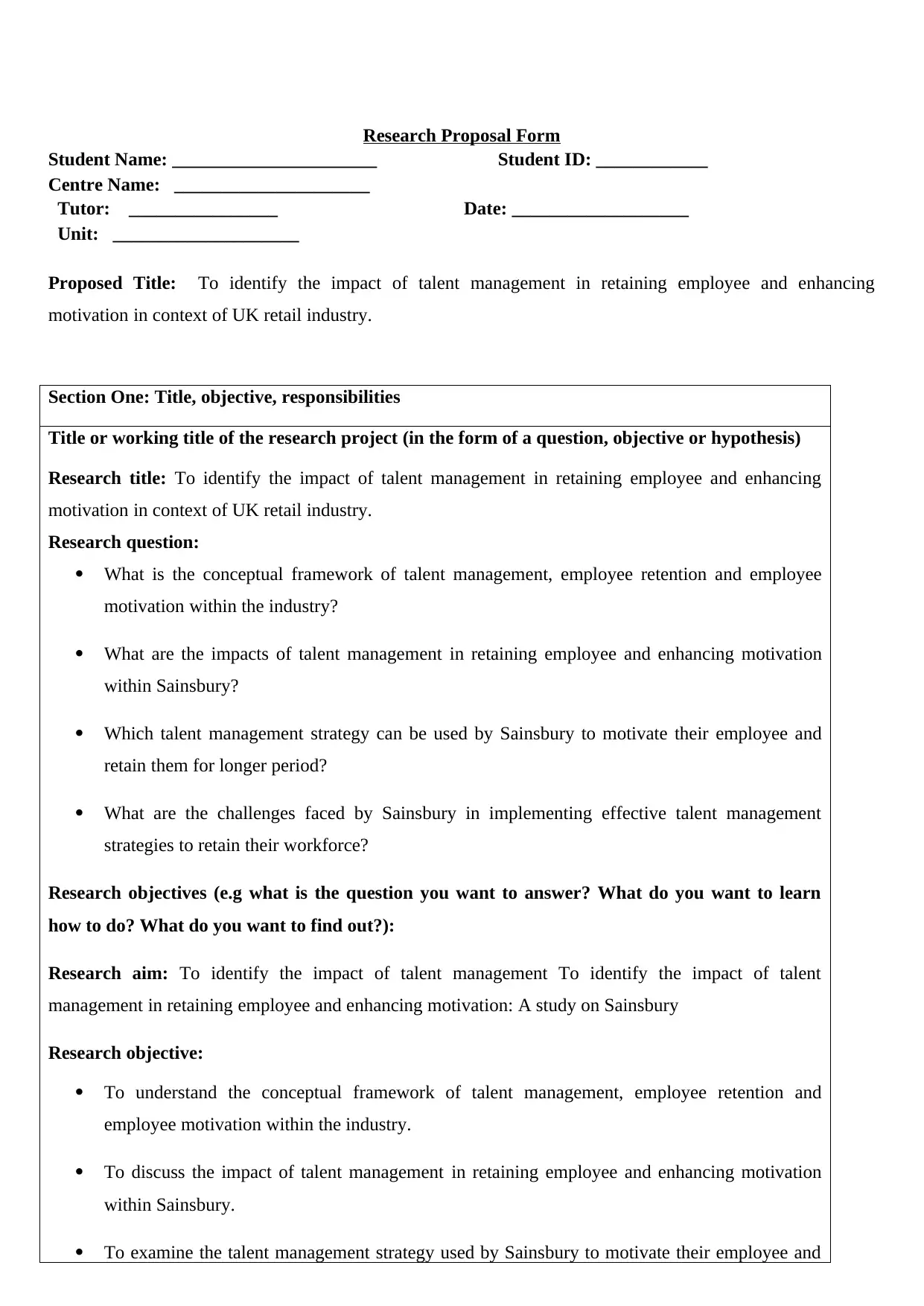
Research Proposal Form
Student Name: ______________________ Student ID: ____________
Centre Name: _____________________
Tutor: ________________ Date: ___________________
Unit: ____________________
Proposed Title: To identify the impact of talent management in retaining employee and enhancing
motivation in context of UK retail industry.
Section One: Title, objective, responsibilities
Title or working title of the research project (in the form of a question, objective or hypothesis)
Research title: To identify the impact of talent management in retaining employee and enhancing
motivation in context of UK retail industry.
Research question:
What is the conceptual framework of talent management, employee retention and employee
motivation within the industry?
What are the impacts of talent management in retaining employee and enhancing motivation
within Sainsbury?
Which talent management strategy can be used by Sainsbury to motivate their employee and
retain them for longer period?
What are the challenges faced by Sainsbury in implementing effective talent management
strategies to retain their workforce?
Research objectives (e.g what is the question you want to answer? What do you want to learn
how to do? What do you want to find out?):
Research aim: To identify the impact of talent management To identify the impact of talent
management in retaining employee and enhancing motivation: A study on Sainsbury
Research objective:
To understand the conceptual framework of talent management, employee retention and
employee motivation within the industry.
To discuss the impact of talent management in retaining employee and enhancing motivation
within Sainsbury.
To examine the talent management strategy used by Sainsbury to motivate their employee and
Student Name: ______________________ Student ID: ____________
Centre Name: _____________________
Tutor: ________________ Date: ___________________
Unit: ____________________
Proposed Title: To identify the impact of talent management in retaining employee and enhancing
motivation in context of UK retail industry.
Section One: Title, objective, responsibilities
Title or working title of the research project (in the form of a question, objective or hypothesis)
Research title: To identify the impact of talent management in retaining employee and enhancing
motivation in context of UK retail industry.
Research question:
What is the conceptual framework of talent management, employee retention and employee
motivation within the industry?
What are the impacts of talent management in retaining employee and enhancing motivation
within Sainsbury?
Which talent management strategy can be used by Sainsbury to motivate their employee and
retain them for longer period?
What are the challenges faced by Sainsbury in implementing effective talent management
strategies to retain their workforce?
Research objectives (e.g what is the question you want to answer? What do you want to learn
how to do? What do you want to find out?):
Research aim: To identify the impact of talent management To identify the impact of talent
management in retaining employee and enhancing motivation: A study on Sainsbury
Research objective:
To understand the conceptual framework of talent management, employee retention and
employee motivation within the industry.
To discuss the impact of talent management in retaining employee and enhancing motivation
within Sainsbury.
To examine the talent management strategy used by Sainsbury to motivate their employee and
Paraphrase This Document
Need a fresh take? Get an instant paraphrase of this document with our AI Paraphraser
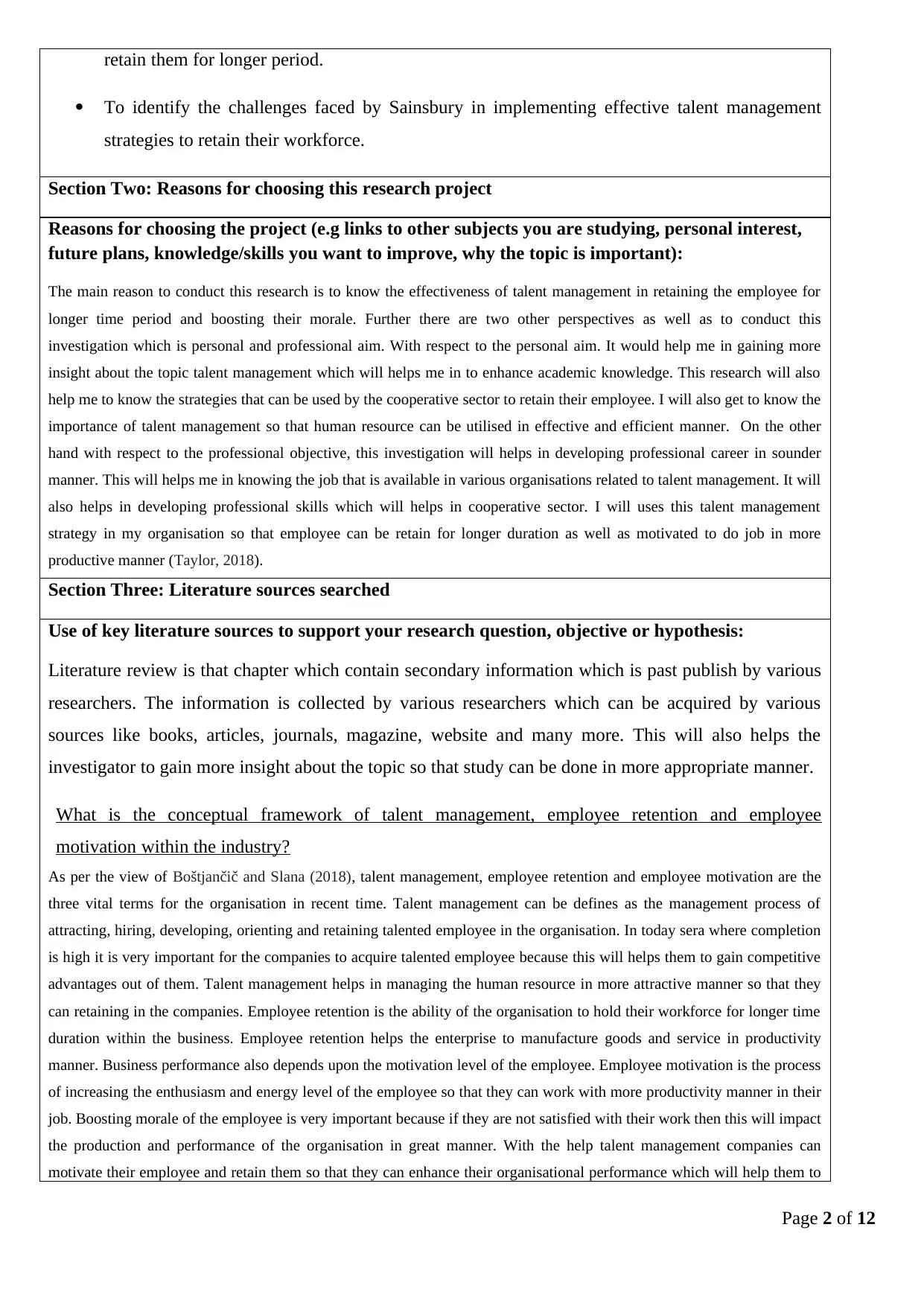
retain them for longer period.
To identify the challenges faced by Sainsbury in implementing effective talent management
strategies to retain their workforce.
Section Two: Reasons for choosing this research project
Reasons for choosing the project (e.g links to other subjects you are studying, personal interest,
future plans, knowledge/skills you want to improve, why the topic is important):
The main reason to conduct this research is to know the effectiveness of talent management in retaining the employee for
longer time period and boosting their morale. Further there are two other perspectives as well as to conduct this
investigation which is personal and professional aim. With respect to the personal aim. It would help me in gaining more
insight about the topic talent management which will helps me in to enhance academic knowledge. This research will also
help me to know the strategies that can be used by the cooperative sector to retain their employee. I will also get to know the
importance of talent management so that human resource can be utilised in effective and efficient manner. On the other
hand with respect to the professional objective, this investigation will helps in developing professional career in sounder
manner. This will helps me in knowing the job that is available in various organisations related to talent management. It will
also helps in developing professional skills which will helps in cooperative sector. I will uses this talent management
strategy in my organisation so that employee can be retain for longer duration as well as motivated to do job in more
productive manner (Taylor, 2018).
Section Three: Literature sources searched
Use of key literature sources to support your research question, objective or hypothesis:
Literature review is that chapter which contain secondary information which is past publish by various
researchers. The information is collected by various researchers which can be acquired by various
sources like books, articles, journals, magazine, website and many more. This will also helps the
investigator to gain more insight about the topic so that study can be done in more appropriate manner.
What is the conceptual framework of talent management, employee retention and employee
motivation within the industry?
As per the view of Boštjančič and Slana (2018), talent management, employee retention and employee motivation are the
three vital terms for the organisation in recent time. Talent management can be defines as the management process of
attracting, hiring, developing, orienting and retaining talented employee in the organisation. In today sera where completion
is high it is very important for the companies to acquire talented employee because this will helps them to gain competitive
advantages out of them. Talent management helps in managing the human resource in more attractive manner so that they
can retaining in the companies. Employee retention is the ability of the organisation to hold their workforce for longer time
duration within the business. Employee retention helps the enterprise to manufacture goods and service in productivity
manner. Business performance also depends upon the motivation level of the employee. Employee motivation is the process
of increasing the enthusiasm and energy level of the employee so that they can work with more productivity manner in their
job. Boosting morale of the employee is very important because if they are not satisfied with their work then this will impact
the production and performance of the organisation in great manner. With the help talent management companies can
motivate their employee and retain them so that they can enhance their organisational performance which will help them to
Page 2 of 12
To identify the challenges faced by Sainsbury in implementing effective talent management
strategies to retain their workforce.
Section Two: Reasons for choosing this research project
Reasons for choosing the project (e.g links to other subjects you are studying, personal interest,
future plans, knowledge/skills you want to improve, why the topic is important):
The main reason to conduct this research is to know the effectiveness of talent management in retaining the employee for
longer time period and boosting their morale. Further there are two other perspectives as well as to conduct this
investigation which is personal and professional aim. With respect to the personal aim. It would help me in gaining more
insight about the topic talent management which will helps me in to enhance academic knowledge. This research will also
help me to know the strategies that can be used by the cooperative sector to retain their employee. I will also get to know the
importance of talent management so that human resource can be utilised in effective and efficient manner. On the other
hand with respect to the professional objective, this investigation will helps in developing professional career in sounder
manner. This will helps me in knowing the job that is available in various organisations related to talent management. It will
also helps in developing professional skills which will helps in cooperative sector. I will uses this talent management
strategy in my organisation so that employee can be retain for longer duration as well as motivated to do job in more
productive manner (Taylor, 2018).
Section Three: Literature sources searched
Use of key literature sources to support your research question, objective or hypothesis:
Literature review is that chapter which contain secondary information which is past publish by various
researchers. The information is collected by various researchers which can be acquired by various
sources like books, articles, journals, magazine, website and many more. This will also helps the
investigator to gain more insight about the topic so that study can be done in more appropriate manner.
What is the conceptual framework of talent management, employee retention and employee
motivation within the industry?
As per the view of Boštjančič and Slana (2018), talent management, employee retention and employee motivation are the
three vital terms for the organisation in recent time. Talent management can be defines as the management process of
attracting, hiring, developing, orienting and retaining talented employee in the organisation. In today sera where completion
is high it is very important for the companies to acquire talented employee because this will helps them to gain competitive
advantages out of them. Talent management helps in managing the human resource in more attractive manner so that they
can retaining in the companies. Employee retention is the ability of the organisation to hold their workforce for longer time
duration within the business. Employee retention helps the enterprise to manufacture goods and service in productivity
manner. Business performance also depends upon the motivation level of the employee. Employee motivation is the process
of increasing the enthusiasm and energy level of the employee so that they can work with more productivity manner in their
job. Boosting morale of the employee is very important because if they are not satisfied with their work then this will impact
the production and performance of the organisation in great manner. With the help talent management companies can
motivate their employee and retain them so that they can enhance their organisational performance which will help them to
Page 2 of 12
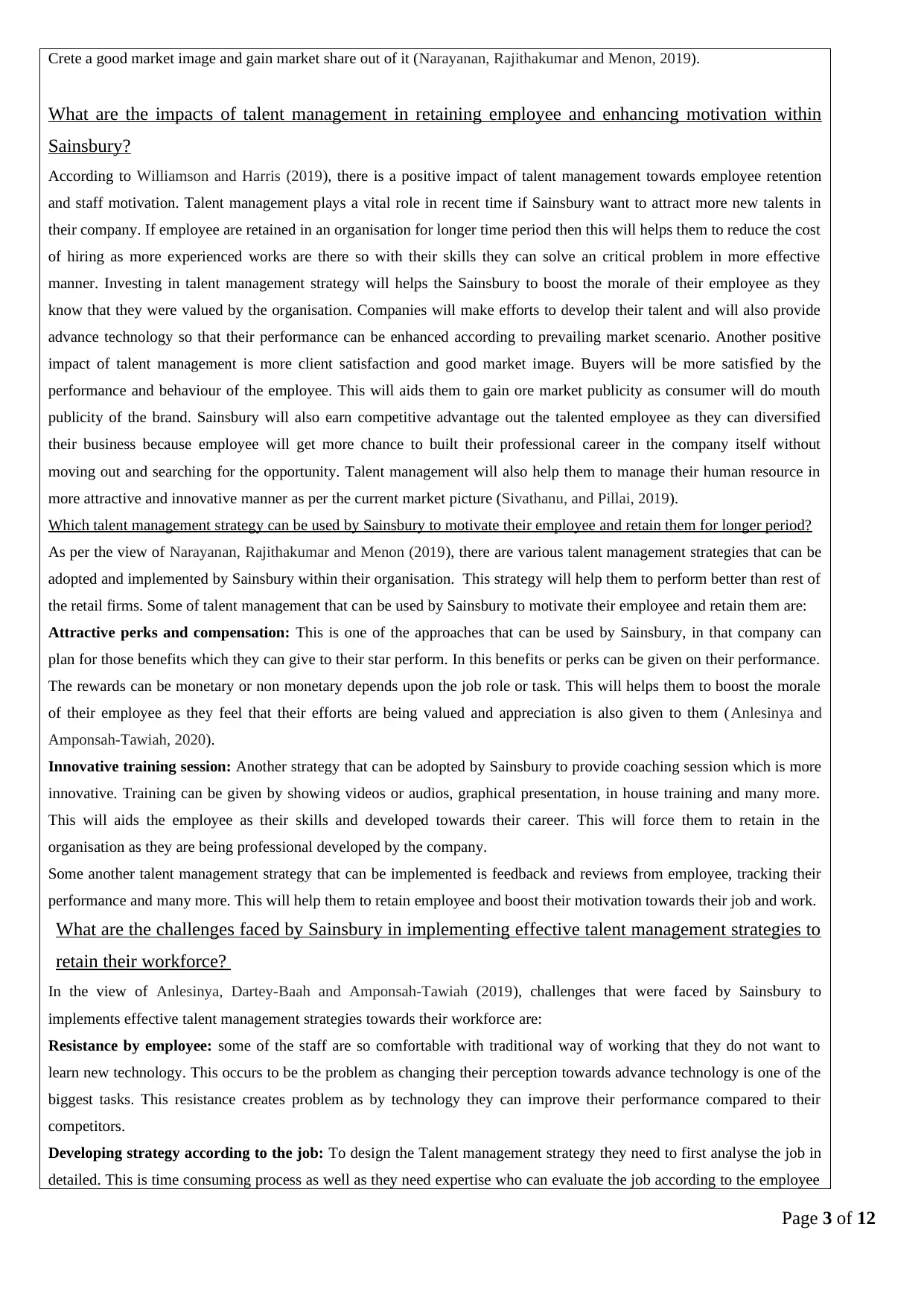
Crete a good market image and gain market share out of it (Narayanan, Rajithakumar and Menon, 2019).
What are the impacts of talent management in retaining employee and enhancing motivation within
Sainsbury?
According to Williamson and Harris (2019), there is a positive impact of talent management towards employee retention
and staff motivation. Talent management plays a vital role in recent time if Sainsbury want to attract more new talents in
their company. If employee are retained in an organisation for longer time period then this will helps them to reduce the cost
of hiring as more experienced works are there so with their skills they can solve an critical problem in more effective
manner. Investing in talent management strategy will helps the Sainsbury to boost the morale of their employee as they
know that they were valued by the organisation. Companies will make efforts to develop their talent and will also provide
advance technology so that their performance can be enhanced according to prevailing market scenario. Another positive
impact of talent management is more client satisfaction and good market image. Buyers will be more satisfied by the
performance and behaviour of the employee. This will aids them to gain ore market publicity as consumer will do mouth
publicity of the brand. Sainsbury will also earn competitive advantage out the talented employee as they can diversified
their business because employee will get more chance to built their professional career in the company itself without
moving out and searching for the opportunity. Talent management will also help them to manage their human resource in
more attractive and innovative manner as per the current market picture (Sivathanu, and Pillai, 2019).
Which talent management strategy can be used by Sainsbury to motivate their employee and retain them for longer period?
As per the view of Narayanan, Rajithakumar and Menon (2019), there are various talent management strategies that can be
adopted and implemented by Sainsbury within their organisation. This strategy will help them to perform better than rest of
the retail firms. Some of talent management that can be used by Sainsbury to motivate their employee and retain them are:
Attractive perks and compensation: This is one of the approaches that can be used by Sainsbury, in that company can
plan for those benefits which they can give to their star perform. In this benefits or perks can be given on their performance.
The rewards can be monetary or non monetary depends upon the job role or task. This will helps them to boost the morale
of their employee as they feel that their efforts are being valued and appreciation is also given to them ( Anlesinya and
Amponsah-Tawiah, 2020).
Innovative training session: Another strategy that can be adopted by Sainsbury to provide coaching session which is more
innovative. Training can be given by showing videos or audios, graphical presentation, in house training and many more.
This will aids the employee as their skills and developed towards their career. This will force them to retain in the
organisation as they are being professional developed by the company.
Some another talent management strategy that can be implemented is feedback and reviews from employee, tracking their
performance and many more. This will help them to retain employee and boost their motivation towards their job and work.
What are the challenges faced by Sainsbury in implementing effective talent management strategies to
retain their workforce?
In the view of Anlesinya, Dartey-Baah and Amponsah-Tawiah (2019), challenges that were faced by Sainsbury to
implements effective talent management strategies towards their workforce are:
Resistance by employee: some of the staff are so comfortable with traditional way of working that they do not want to
learn new technology. This occurs to be the problem as changing their perception towards advance technology is one of the
biggest tasks. This resistance creates problem as by technology they can improve their performance compared to their
competitors.
Developing strategy according to the job: To design the Talent management strategy they need to first analyse the job in
detailed. This is time consuming process as well as they need expertise who can evaluate the job according to the employee
Page 3 of 12
What are the impacts of talent management in retaining employee and enhancing motivation within
Sainsbury?
According to Williamson and Harris (2019), there is a positive impact of talent management towards employee retention
and staff motivation. Talent management plays a vital role in recent time if Sainsbury want to attract more new talents in
their company. If employee are retained in an organisation for longer time period then this will helps them to reduce the cost
of hiring as more experienced works are there so with their skills they can solve an critical problem in more effective
manner. Investing in talent management strategy will helps the Sainsbury to boost the morale of their employee as they
know that they were valued by the organisation. Companies will make efforts to develop their talent and will also provide
advance technology so that their performance can be enhanced according to prevailing market scenario. Another positive
impact of talent management is more client satisfaction and good market image. Buyers will be more satisfied by the
performance and behaviour of the employee. This will aids them to gain ore market publicity as consumer will do mouth
publicity of the brand. Sainsbury will also earn competitive advantage out the talented employee as they can diversified
their business because employee will get more chance to built their professional career in the company itself without
moving out and searching for the opportunity. Talent management will also help them to manage their human resource in
more attractive and innovative manner as per the current market picture (Sivathanu, and Pillai, 2019).
Which talent management strategy can be used by Sainsbury to motivate their employee and retain them for longer period?
As per the view of Narayanan, Rajithakumar and Menon (2019), there are various talent management strategies that can be
adopted and implemented by Sainsbury within their organisation. This strategy will help them to perform better than rest of
the retail firms. Some of talent management that can be used by Sainsbury to motivate their employee and retain them are:
Attractive perks and compensation: This is one of the approaches that can be used by Sainsbury, in that company can
plan for those benefits which they can give to their star perform. In this benefits or perks can be given on their performance.
The rewards can be monetary or non monetary depends upon the job role or task. This will helps them to boost the morale
of their employee as they feel that their efforts are being valued and appreciation is also given to them ( Anlesinya and
Amponsah-Tawiah, 2020).
Innovative training session: Another strategy that can be adopted by Sainsbury to provide coaching session which is more
innovative. Training can be given by showing videos or audios, graphical presentation, in house training and many more.
This will aids the employee as their skills and developed towards their career. This will force them to retain in the
organisation as they are being professional developed by the company.
Some another talent management strategy that can be implemented is feedback and reviews from employee, tracking their
performance and many more. This will help them to retain employee and boost their motivation towards their job and work.
What are the challenges faced by Sainsbury in implementing effective talent management strategies to
retain their workforce?
In the view of Anlesinya, Dartey-Baah and Amponsah-Tawiah (2019), challenges that were faced by Sainsbury to
implements effective talent management strategies towards their workforce are:
Resistance by employee: some of the staff are so comfortable with traditional way of working that they do not want to
learn new technology. This occurs to be the problem as changing their perception towards advance technology is one of the
biggest tasks. This resistance creates problem as by technology they can improve their performance compared to their
competitors.
Developing strategy according to the job: To design the Talent management strategy they need to first analyse the job in
detailed. This is time consuming process as well as they need expertise who can evaluate the job according to the employee
Page 3 of 12
⊘ This is a preview!⊘
Do you want full access?
Subscribe today to unlock all pages.

Trusted by 1+ million students worldwide
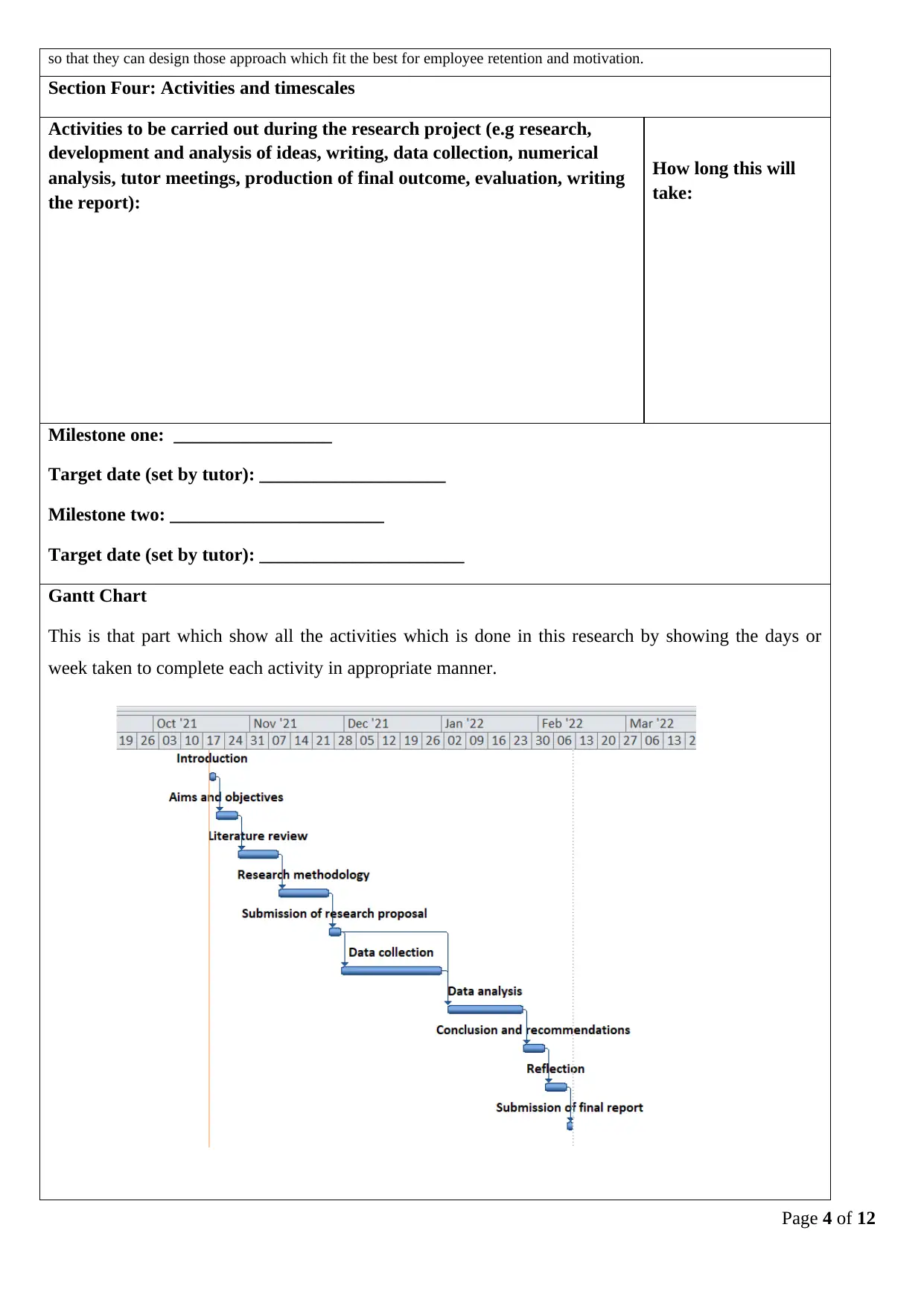
so that they can design those approach which fit the best for employee retention and motivation.
Section Four: Activities and timescales
Activities to be carried out during the research project (e.g research,
development and analysis of ideas, writing, data collection, numerical
analysis, tutor meetings, production of final outcome, evaluation, writing
the report):
How long this will
take:
Milestone one: _________________
Target date (set by tutor): ____________________
Milestone two: _______________________
Target date (set by tutor): ______________________
Gantt Chart
This is that part which show all the activities which is done in this research by showing the days or
week taken to complete each activity in appropriate manner.
Page 4 of 12
Section Four: Activities and timescales
Activities to be carried out during the research project (e.g research,
development and analysis of ideas, writing, data collection, numerical
analysis, tutor meetings, production of final outcome, evaluation, writing
the report):
How long this will
take:
Milestone one: _________________
Target date (set by tutor): ____________________
Milestone two: _______________________
Target date (set by tutor): ______________________
Gantt Chart
This is that part which show all the activities which is done in this research by showing the days or
week taken to complete each activity in appropriate manner.
Page 4 of 12
Paraphrase This Document
Need a fresh take? Get an instant paraphrase of this document with our AI Paraphraser
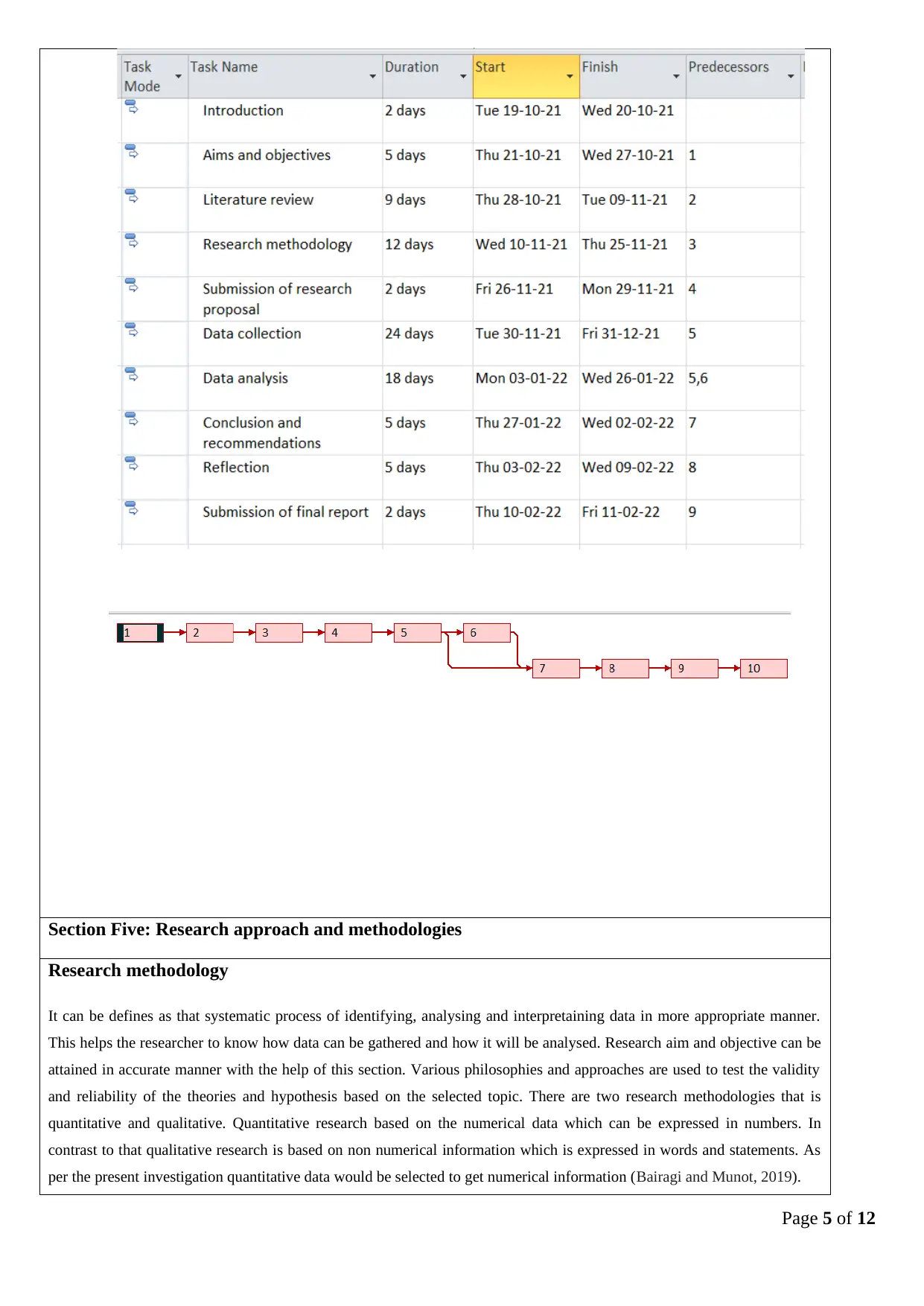
Section Five: Research approach and methodologies
Research methodology
It can be defines as that systematic process of identifying, analysing and interpretaining data in more appropriate manner.
This helps the researcher to know how data can be gathered and how it will be analysed. Research aim and objective can be
attained in accurate manner with the help of this section. Various philosophies and approaches are used to test the validity
and reliability of the theories and hypothesis based on the selected topic. There are two research methodologies that is
quantitative and qualitative. Quantitative research based on the numerical data which can be expressed in numbers. In
contrast to that qualitative research is based on non numerical information which is expressed in words and statements. As
per the present investigation quantitative data would be selected to get numerical information (Bairagi and Munot, 2019).
Page 5 of 12
Research methodology
It can be defines as that systematic process of identifying, analysing and interpretaining data in more appropriate manner.
This helps the researcher to know how data can be gathered and how it will be analysed. Research aim and objective can be
attained in accurate manner with the help of this section. Various philosophies and approaches are used to test the validity
and reliability of the theories and hypothesis based on the selected topic. There are two research methodologies that is
quantitative and qualitative. Quantitative research based on the numerical data which can be expressed in numbers. In
contrast to that qualitative research is based on non numerical information which is expressed in words and statements. As
per the present investigation quantitative data would be selected to get numerical information (Bairagi and Munot, 2019).
Page 5 of 12
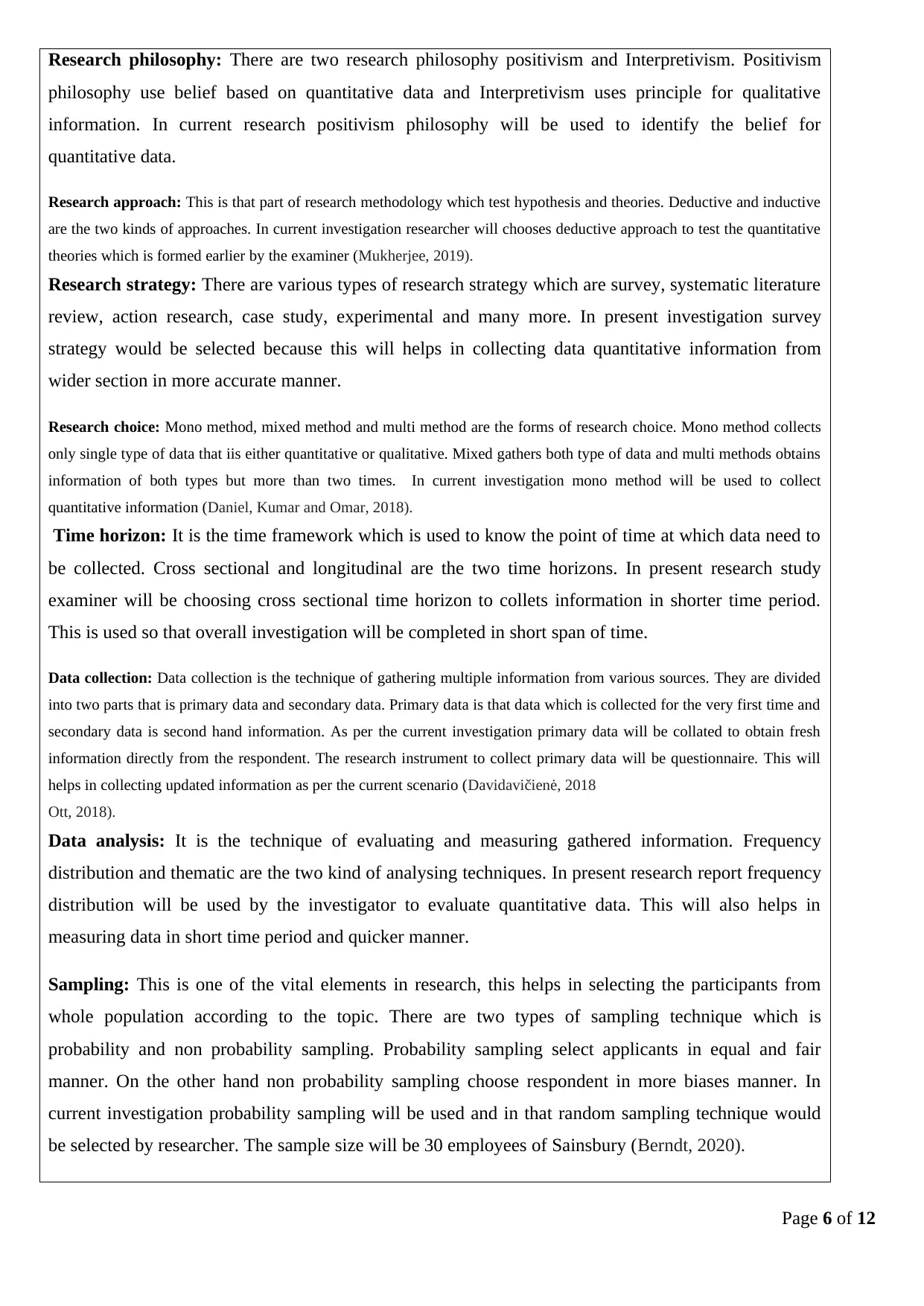
Research philosophy: There are two research philosophy positivism and Interpretivism. Positivism
philosophy use belief based on quantitative data and Interpretivism uses principle for qualitative
information. In current research positivism philosophy will be used to identify the belief for
quantitative data.
Research approach: This is that part of research methodology which test hypothesis and theories. Deductive and inductive
are the two kinds of approaches. In current investigation researcher will chooses deductive approach to test the quantitative
theories which is formed earlier by the examiner (Mukherjee, 2019).
Research strategy: There are various types of research strategy which are survey, systematic literature
review, action research, case study, experimental and many more. In present investigation survey
strategy would be selected because this will helps in collecting data quantitative information from
wider section in more accurate manner.
Research choice: Mono method, mixed method and multi method are the forms of research choice. Mono method collects
only single type of data that iis either quantitative or qualitative. Mixed gathers both type of data and multi methods obtains
information of both types but more than two times. In current investigation mono method will be used to collect
quantitative information (Daniel, Kumar and Omar, 2018).
Time horizon: It is the time framework which is used to know the point of time at which data need to
be collected. Cross sectional and longitudinal are the two time horizons. In present research study
examiner will be choosing cross sectional time horizon to collets information in shorter time period.
This is used so that overall investigation will be completed in short span of time.
Data collection: Data collection is the technique of gathering multiple information from various sources. They are divided
into two parts that is primary data and secondary data. Primary data is that data which is collected for the very first time and
secondary data is second hand information. As per the current investigation primary data will be collated to obtain fresh
information directly from the respondent. The research instrument to collect primary data will be questionnaire. This will
helps in collecting updated information as per the current scenario (Davidavičienė, 2018
Ott, 2018).
Data analysis: It is the technique of evaluating and measuring gathered information. Frequency
distribution and thematic are the two kind of analysing techniques. In present research report frequency
distribution will be used by the investigator to evaluate quantitative data. This will also helps in
measuring data in short time period and quicker manner.
Sampling: This is one of the vital elements in research, this helps in selecting the participants from
whole population according to the topic. There are two types of sampling technique which is
probability and non probability sampling. Probability sampling select applicants in equal and fair
manner. On the other hand non probability sampling choose respondent in more biases manner. In
current investigation probability sampling will be used and in that random sampling technique would
be selected by researcher. The sample size will be 30 employees of Sainsbury (Berndt, 2020).
Page 6 of 12
philosophy use belief based on quantitative data and Interpretivism uses principle for qualitative
information. In current research positivism philosophy will be used to identify the belief for
quantitative data.
Research approach: This is that part of research methodology which test hypothesis and theories. Deductive and inductive
are the two kinds of approaches. In current investigation researcher will chooses deductive approach to test the quantitative
theories which is formed earlier by the examiner (Mukherjee, 2019).
Research strategy: There are various types of research strategy which are survey, systematic literature
review, action research, case study, experimental and many more. In present investigation survey
strategy would be selected because this will helps in collecting data quantitative information from
wider section in more accurate manner.
Research choice: Mono method, mixed method and multi method are the forms of research choice. Mono method collects
only single type of data that iis either quantitative or qualitative. Mixed gathers both type of data and multi methods obtains
information of both types but more than two times. In current investigation mono method will be used to collect
quantitative information (Daniel, Kumar and Omar, 2018).
Time horizon: It is the time framework which is used to know the point of time at which data need to
be collected. Cross sectional and longitudinal are the two time horizons. In present research study
examiner will be choosing cross sectional time horizon to collets information in shorter time period.
This is used so that overall investigation will be completed in short span of time.
Data collection: Data collection is the technique of gathering multiple information from various sources. They are divided
into two parts that is primary data and secondary data. Primary data is that data which is collected for the very first time and
secondary data is second hand information. As per the current investigation primary data will be collated to obtain fresh
information directly from the respondent. The research instrument to collect primary data will be questionnaire. This will
helps in collecting updated information as per the current scenario (Davidavičienė, 2018
Ott, 2018).
Data analysis: It is the technique of evaluating and measuring gathered information. Frequency
distribution and thematic are the two kind of analysing techniques. In present research report frequency
distribution will be used by the investigator to evaluate quantitative data. This will also helps in
measuring data in short time period and quicker manner.
Sampling: This is one of the vital elements in research, this helps in selecting the participants from
whole population according to the topic. There are two types of sampling technique which is
probability and non probability sampling. Probability sampling select applicants in equal and fair
manner. On the other hand non probability sampling choose respondent in more biases manner. In
current investigation probability sampling will be used and in that random sampling technique would
be selected by researcher. The sample size will be 30 employees of Sainsbury (Berndt, 2020).
Page 6 of 12
⊘ This is a preview!⊘
Do you want full access?
Subscribe today to unlock all pages.

Trusted by 1+ million students worldwide
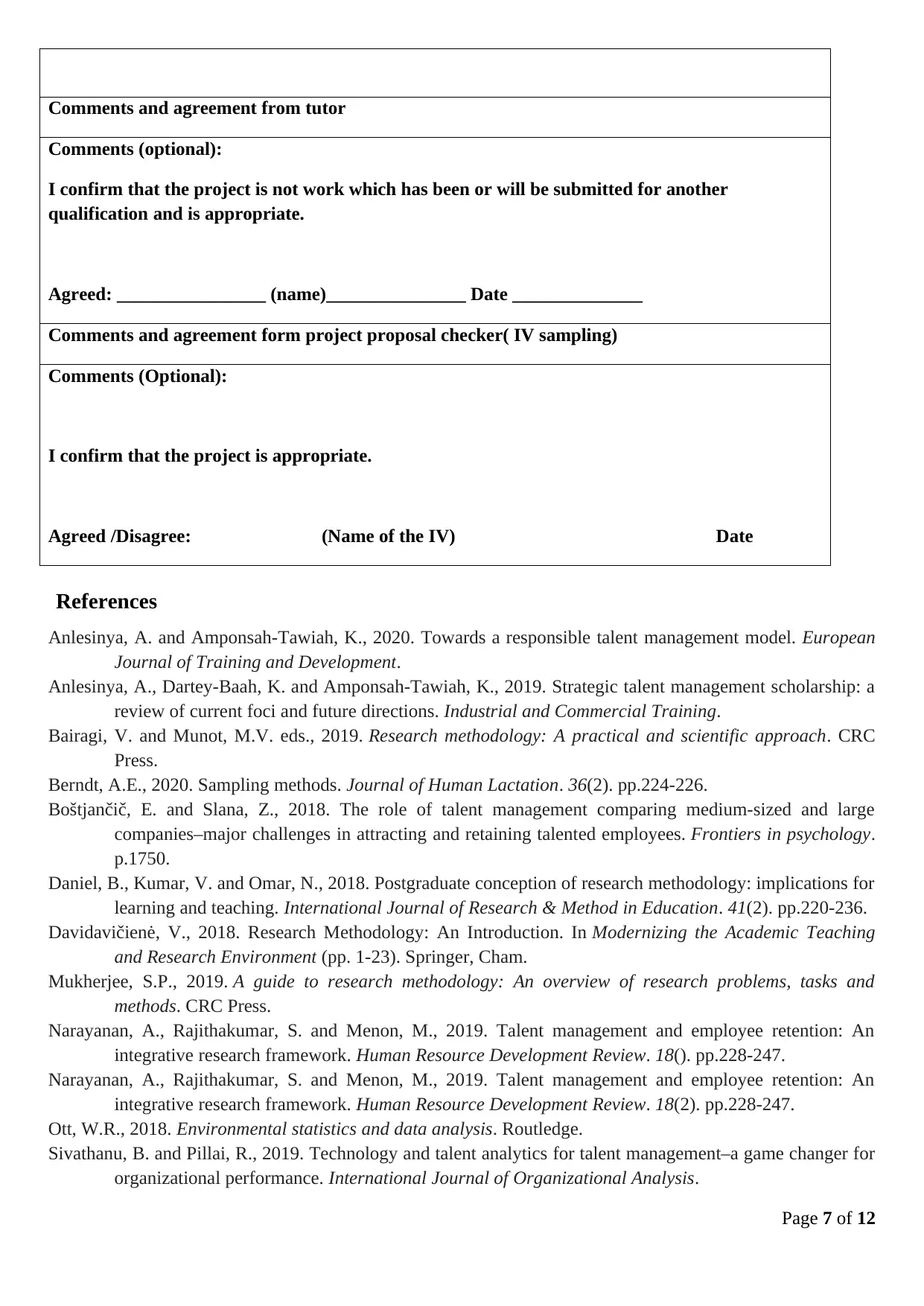
Comments and agreement from tutor
Comments (optional):
I confirm that the project is not work which has been or will be submitted for another
qualification and is appropriate.
Agreed: ________________ (name)_______________ Date ______________
Comments and agreement form project proposal checker( IV sampling)
Comments (Optional):
I confirm that the project is appropriate.
Agreed /Disagree: (Name of the IV) Date
References
Anlesinya, A. and Amponsah-Tawiah, K., 2020. Towards a responsible talent management model. European
Journal of Training and Development.
Anlesinya, A., Dartey-Baah, K. and Amponsah-Tawiah, K., 2019. Strategic talent management scholarship: a
review of current foci and future directions. Industrial and Commercial Training.
Bairagi, V. and Munot, M.V. eds., 2019. Research methodology: A practical and scientific approach. CRC
Press.
Berndt, A.E., 2020. Sampling methods. Journal of Human Lactation. 36(2). pp.224-226.
Boštjančič, E. and Slana, Z., 2018. The role of talent management comparing medium-sized and large
companies–major challenges in attracting and retaining talented employees. Frontiers in psychology.
p.1750.
Daniel, B., Kumar, V. and Omar, N., 2018. Postgraduate conception of research methodology: implications for
learning and teaching. International Journal of Research & Method in Education. 41(2). pp.220-236.
Davidavičienė, V., 2018. Research Methodology: An Introduction. In Modernizing the Academic Teaching
and Research Environment (pp. 1-23). Springer, Cham.
Mukherjee, S.P., 2019. A guide to research methodology: An overview of research problems, tasks and
methods. CRC Press.
Narayanan, A., Rajithakumar, S. and Menon, M., 2019. Talent management and employee retention: An
integrative research framework. Human Resource Development Review. 18(). pp.228-247.
Narayanan, A., Rajithakumar, S. and Menon, M., 2019. Talent management and employee retention: An
integrative research framework. Human Resource Development Review. 18(2). pp.228-247.
Ott, W.R., 2018. Environmental statistics and data analysis. Routledge.
Sivathanu, B. and Pillai, R., 2019. Technology and talent analytics for talent management–a game changer for
organizational performance. International Journal of Organizational Analysis.
Page 7 of 12
Comments (optional):
I confirm that the project is not work which has been or will be submitted for another
qualification and is appropriate.
Agreed: ________________ (name)_______________ Date ______________
Comments and agreement form project proposal checker( IV sampling)
Comments (Optional):
I confirm that the project is appropriate.
Agreed /Disagree: (Name of the IV) Date
References
Anlesinya, A. and Amponsah-Tawiah, K., 2020. Towards a responsible talent management model. European
Journal of Training and Development.
Anlesinya, A., Dartey-Baah, K. and Amponsah-Tawiah, K., 2019. Strategic talent management scholarship: a
review of current foci and future directions. Industrial and Commercial Training.
Bairagi, V. and Munot, M.V. eds., 2019. Research methodology: A practical and scientific approach. CRC
Press.
Berndt, A.E., 2020. Sampling methods. Journal of Human Lactation. 36(2). pp.224-226.
Boštjančič, E. and Slana, Z., 2018. The role of talent management comparing medium-sized and large
companies–major challenges in attracting and retaining talented employees. Frontiers in psychology.
p.1750.
Daniel, B., Kumar, V. and Omar, N., 2018. Postgraduate conception of research methodology: implications for
learning and teaching. International Journal of Research & Method in Education. 41(2). pp.220-236.
Davidavičienė, V., 2018. Research Methodology: An Introduction. In Modernizing the Academic Teaching
and Research Environment (pp. 1-23). Springer, Cham.
Mukherjee, S.P., 2019. A guide to research methodology: An overview of research problems, tasks and
methods. CRC Press.
Narayanan, A., Rajithakumar, S. and Menon, M., 2019. Talent management and employee retention: An
integrative research framework. Human Resource Development Review. 18(). pp.228-247.
Narayanan, A., Rajithakumar, S. and Menon, M., 2019. Talent management and employee retention: An
integrative research framework. Human Resource Development Review. 18(2). pp.228-247.
Ott, W.R., 2018. Environmental statistics and data analysis. Routledge.
Sivathanu, B. and Pillai, R., 2019. Technology and talent analytics for talent management–a game changer for
organizational performance. International Journal of Organizational Analysis.
Page 7 of 12
Paraphrase This Document
Need a fresh take? Get an instant paraphrase of this document with our AI Paraphraser
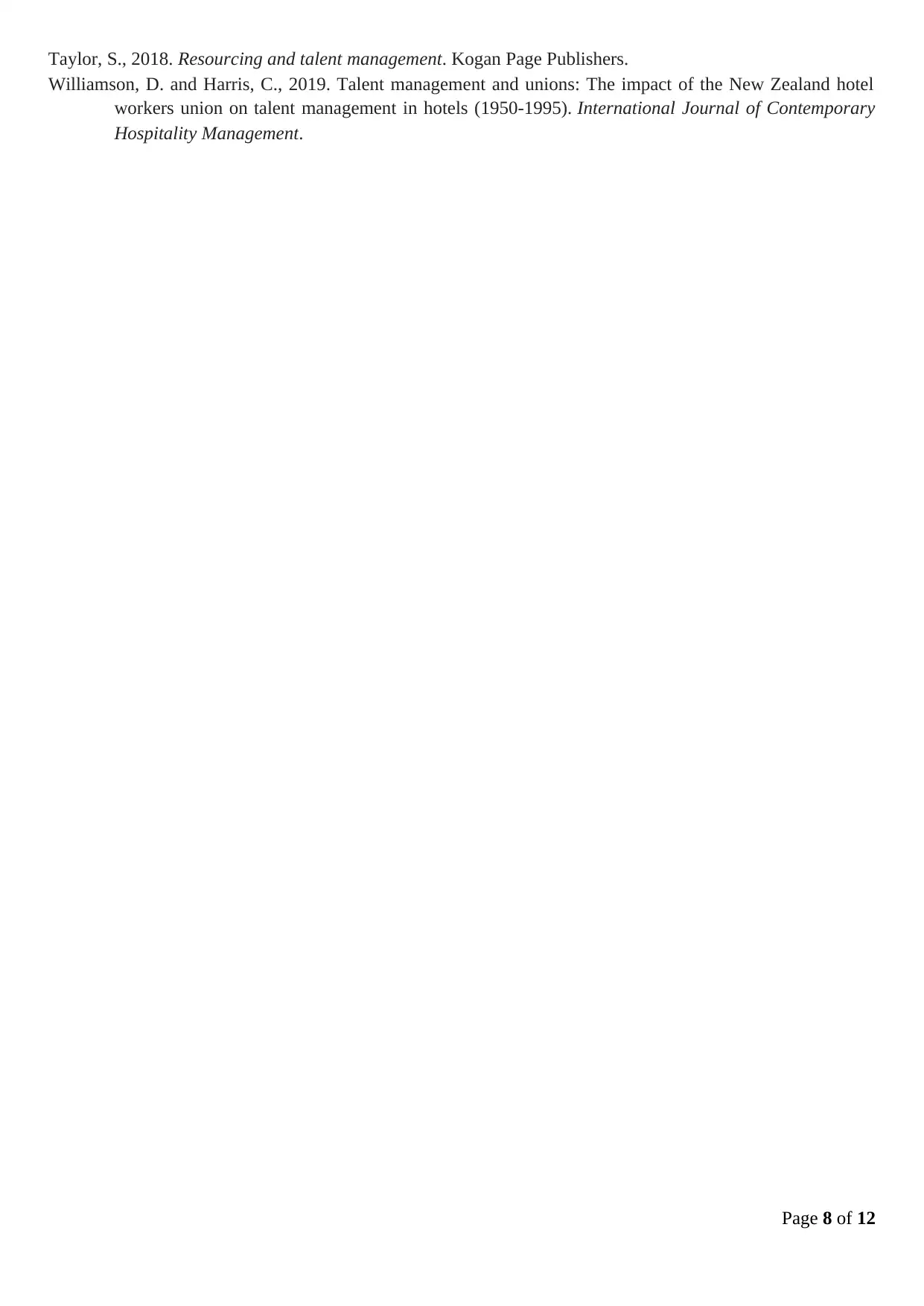
Taylor, S., 2018. Resourcing and talent management. Kogan Page Publishers.
Williamson, D. and Harris, C., 2019. Talent management and unions: The impact of the New Zealand hotel
workers union on talent management in hotels (1950-1995). International Journal of Contemporary
Hospitality Management.
Page 8 of 12
Williamson, D. and Harris, C., 2019. Talent management and unions: The impact of the New Zealand hotel
workers union on talent management in hotels (1950-1995). International Journal of Contemporary
Hospitality Management.
Page 8 of 12
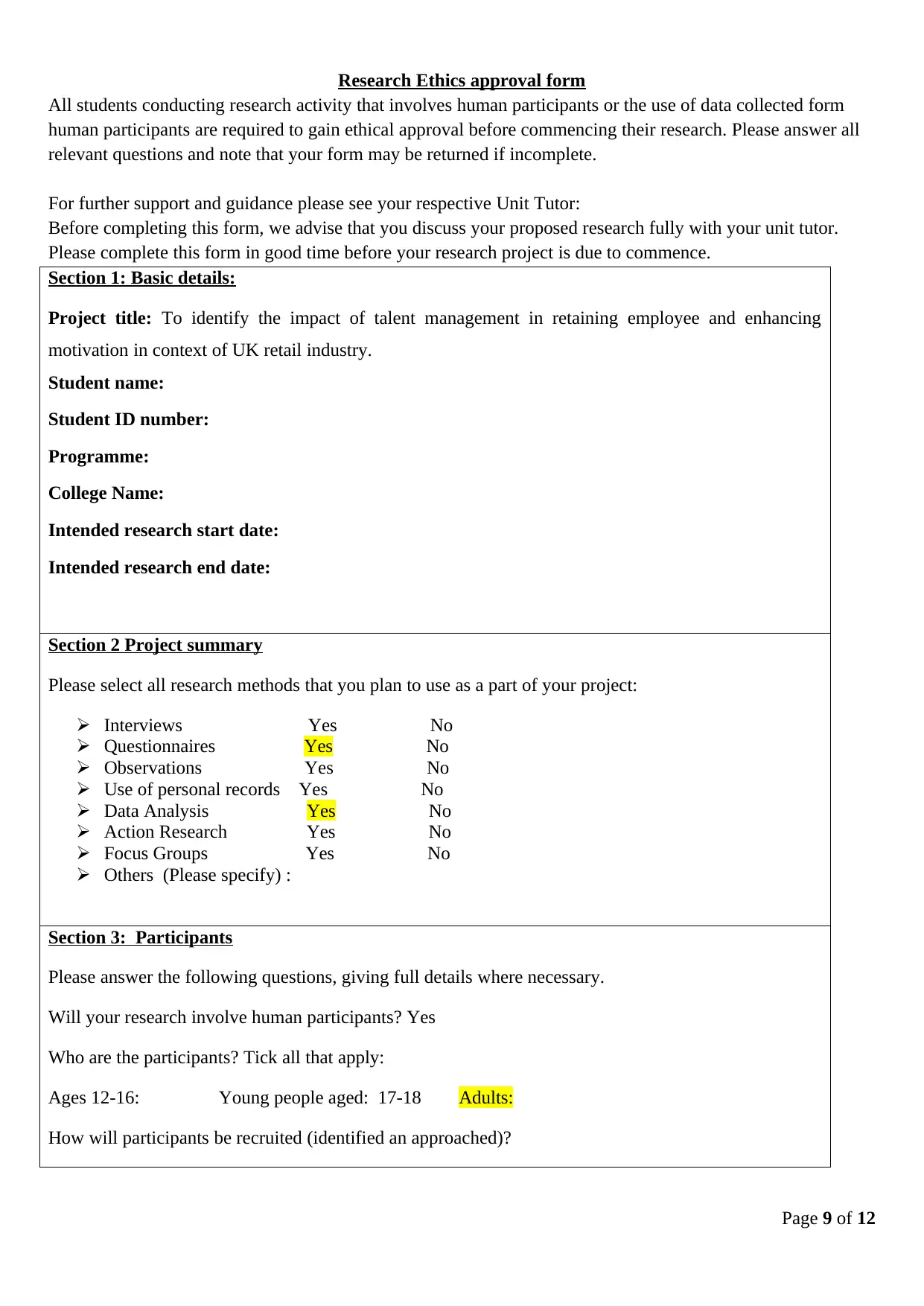
Research Ethics approval form
All students conducting research activity that involves human participants or the use of data collected form
human participants are required to gain ethical approval before commencing their research. Please answer all
relevant questions and note that your form may be returned if incomplete.
For further support and guidance please see your respective Unit Tutor:
Before completing this form, we advise that you discuss your proposed research fully with your unit tutor.
Please complete this form in good time before your research project is due to commence.
Section 1: Basic details:
Project title: To identify the impact of talent management in retaining employee and enhancing
motivation in context of UK retail industry.
Student name:
Student ID number:
Programme:
College Name:
Intended research start date:
Intended research end date:
Section 2 Project summary
Please select all research methods that you plan to use as a part of your project:
Interviews Yes No
Questionnaires Yes No
Observations Yes No
Use of personal records Yes No
Data Analysis Yes No
Action Research Yes No
Focus Groups Yes No
Others (Please specify) :
Section 3: Participants
Please answer the following questions, giving full details where necessary.
Will your research involve human participants? Yes
Who are the participants? Tick all that apply:
Ages 12-16: Young people aged: 17-18 Adults:
How will participants be recruited (identified an approached)?
Page 9 of 12
All students conducting research activity that involves human participants or the use of data collected form
human participants are required to gain ethical approval before commencing their research. Please answer all
relevant questions and note that your form may be returned if incomplete.
For further support and guidance please see your respective Unit Tutor:
Before completing this form, we advise that you discuss your proposed research fully with your unit tutor.
Please complete this form in good time before your research project is due to commence.
Section 1: Basic details:
Project title: To identify the impact of talent management in retaining employee and enhancing
motivation in context of UK retail industry.
Student name:
Student ID number:
Programme:
College Name:
Intended research start date:
Intended research end date:
Section 2 Project summary
Please select all research methods that you plan to use as a part of your project:
Interviews Yes No
Questionnaires Yes No
Observations Yes No
Use of personal records Yes No
Data Analysis Yes No
Action Research Yes No
Focus Groups Yes No
Others (Please specify) :
Section 3: Participants
Please answer the following questions, giving full details where necessary.
Will your research involve human participants? Yes
Who are the participants? Tick all that apply:
Ages 12-16: Young people aged: 17-18 Adults:
How will participants be recruited (identified an approached)?
Page 9 of 12
⊘ This is a preview!⊘
Do you want full access?
Subscribe today to unlock all pages.

Trusted by 1+ million students worldwide
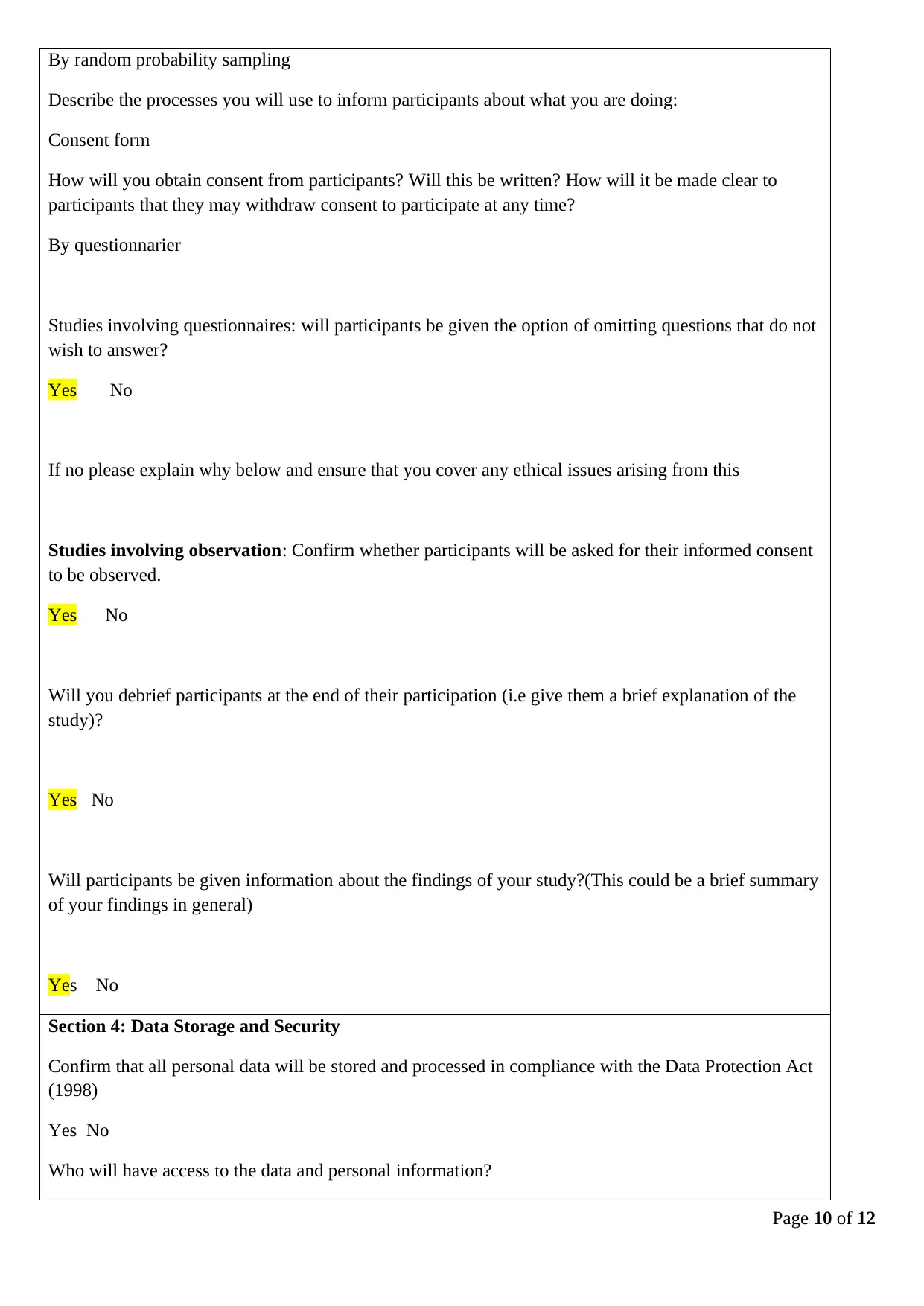
By random probability sampling
Describe the processes you will use to inform participants about what you are doing:
Consent form
How will you obtain consent from participants? Will this be written? How will it be made clear to
participants that they may withdraw consent to participate at any time?
By questionnarier
Studies involving questionnaires: will participants be given the option of omitting questions that do not
wish to answer?
Yes No
If no please explain why below and ensure that you cover any ethical issues arising from this
Studies involving observation: Confirm whether participants will be asked for their informed consent
to be observed.
Yes No
Will you debrief participants at the end of their participation (i.e give them a brief explanation of the
study)?
Yes No
Will participants be given information about the findings of your study?(This could be a brief summary
of your findings in general)
Yes No
Section 4: Data Storage and Security
Confirm that all personal data will be stored and processed in compliance with the Data Protection Act
(1998)
Yes No
Who will have access to the data and personal information?
Page 10 of 12
Describe the processes you will use to inform participants about what you are doing:
Consent form
How will you obtain consent from participants? Will this be written? How will it be made clear to
participants that they may withdraw consent to participate at any time?
By questionnarier
Studies involving questionnaires: will participants be given the option of omitting questions that do not
wish to answer?
Yes No
If no please explain why below and ensure that you cover any ethical issues arising from this
Studies involving observation: Confirm whether participants will be asked for their informed consent
to be observed.
Yes No
Will you debrief participants at the end of their participation (i.e give them a brief explanation of the
study)?
Yes No
Will participants be given information about the findings of your study?(This could be a brief summary
of your findings in general)
Yes No
Section 4: Data Storage and Security
Confirm that all personal data will be stored and processed in compliance with the Data Protection Act
(1998)
Yes No
Who will have access to the data and personal information?
Page 10 of 12
Paraphrase This Document
Need a fresh take? Get an instant paraphrase of this document with our AI Paraphraser
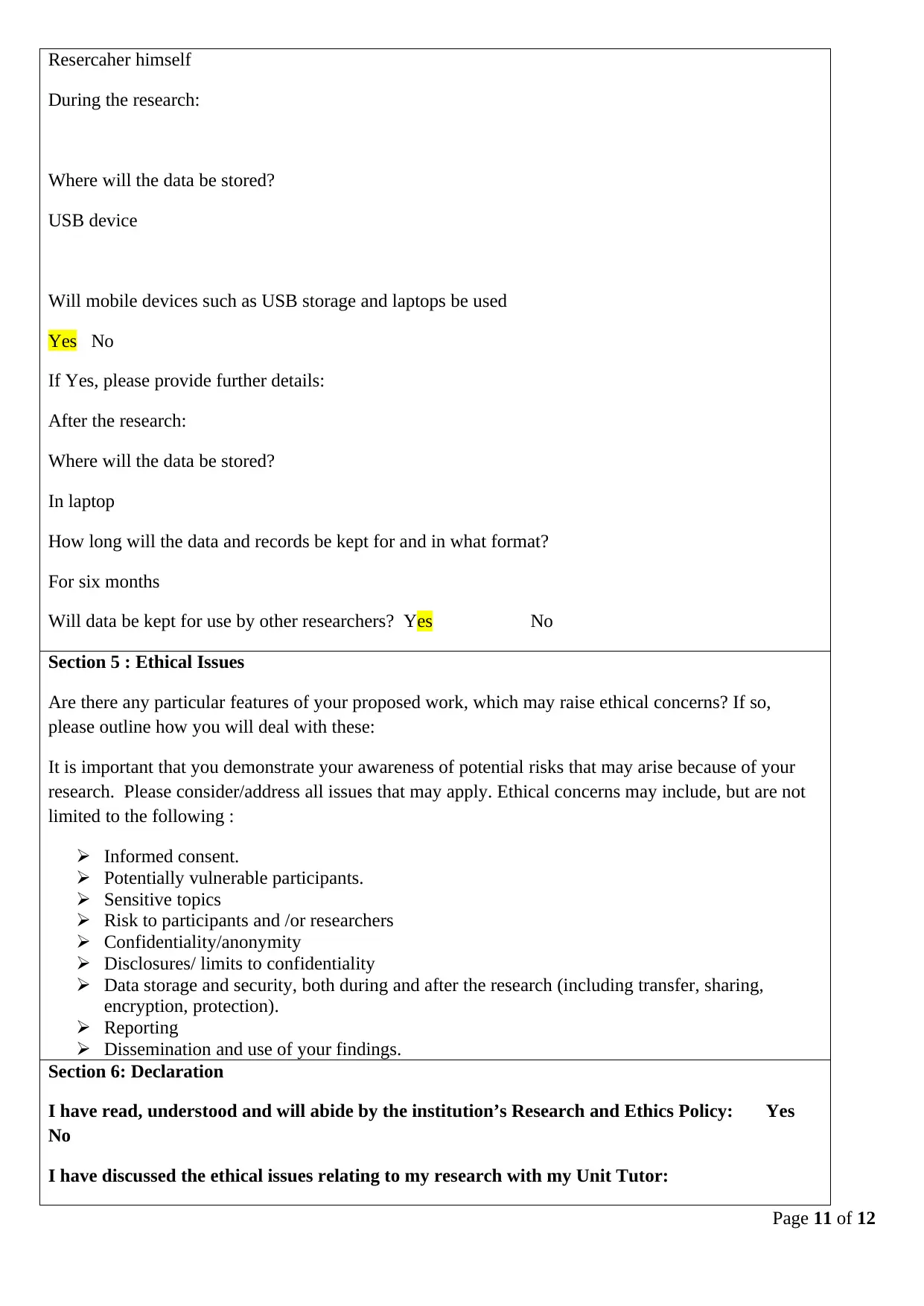
Resercaher himself
During the research:
Where will the data be stored?
USB device
Will mobile devices such as USB storage and laptops be used
Yes No
If Yes, please provide further details:
After the research:
Where will the data be stored?
In laptop
How long will the data and records be kept for and in what format?
For six months
Will data be kept for use by other researchers? Yes No
Section 5 : Ethical Issues
Are there any particular features of your proposed work, which may raise ethical concerns? If so,
please outline how you will deal with these:
It is important that you demonstrate your awareness of potential risks that may arise because of your
research. Please consider/address all issues that may apply. Ethical concerns may include, but are not
limited to the following :
Informed consent.
Potentially vulnerable participants.
Sensitive topics
Risk to participants and /or researchers
Confidentiality/anonymity
Disclosures/ limits to confidentiality
Data storage and security, both during and after the research (including transfer, sharing,
encryption, protection).
Reporting
Dissemination and use of your findings.
Section 6: Declaration
I have read, understood and will abide by the institution’s Research and Ethics Policy: Yes
No
I have discussed the ethical issues relating to my research with my Unit Tutor:
Page 11 of 12
During the research:
Where will the data be stored?
USB device
Will mobile devices such as USB storage and laptops be used
Yes No
If Yes, please provide further details:
After the research:
Where will the data be stored?
In laptop
How long will the data and records be kept for and in what format?
For six months
Will data be kept for use by other researchers? Yes No
Section 5 : Ethical Issues
Are there any particular features of your proposed work, which may raise ethical concerns? If so,
please outline how you will deal with these:
It is important that you demonstrate your awareness of potential risks that may arise because of your
research. Please consider/address all issues that may apply. Ethical concerns may include, but are not
limited to the following :
Informed consent.
Potentially vulnerable participants.
Sensitive topics
Risk to participants and /or researchers
Confidentiality/anonymity
Disclosures/ limits to confidentiality
Data storage and security, both during and after the research (including transfer, sharing,
encryption, protection).
Reporting
Dissemination and use of your findings.
Section 6: Declaration
I have read, understood and will abide by the institution’s Research and Ethics Policy: Yes
No
I have discussed the ethical issues relating to my research with my Unit Tutor:
Page 11 of 12
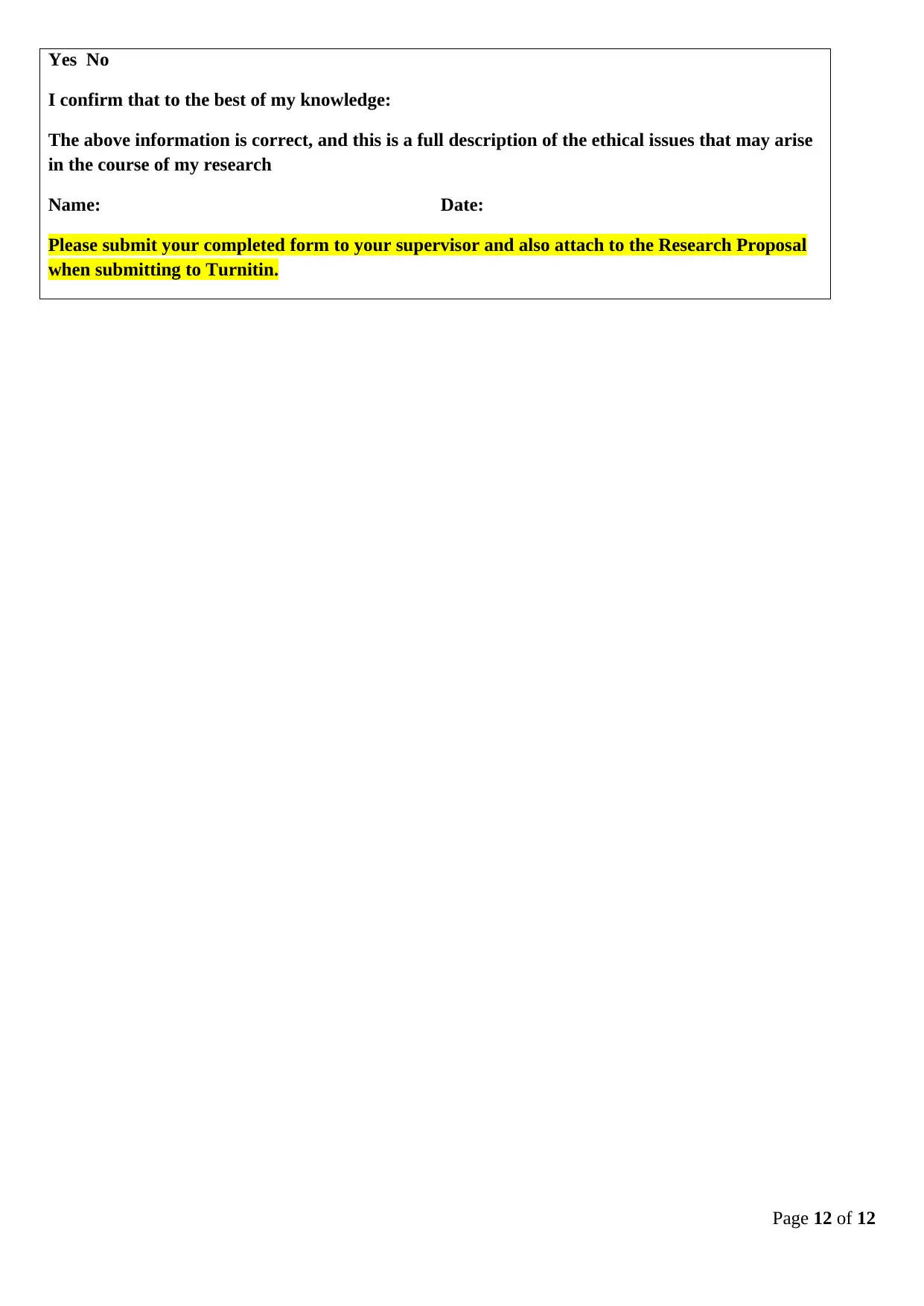
Yes No
I confirm that to the best of my knowledge:
The above information is correct, and this is a full description of the ethical issues that may arise
in the course of my research
Name: Date:
Please submit your completed form to your supervisor and also attach to the Research Proposal
when submitting to Turnitin.
Page 12 of 12
I confirm that to the best of my knowledge:
The above information is correct, and this is a full description of the ethical issues that may arise
in the course of my research
Name: Date:
Please submit your completed form to your supervisor and also attach to the Research Proposal
when submitting to Turnitin.
Page 12 of 12
⊘ This is a preview!⊘
Do you want full access?
Subscribe today to unlock all pages.

Trusted by 1+ million students worldwide
1 out of 12
Related Documents
Your All-in-One AI-Powered Toolkit for Academic Success.
+13062052269
info@desklib.com
Available 24*7 on WhatsApp / Email
![[object Object]](/_next/static/media/star-bottom.7253800d.svg)
Unlock your academic potential
Copyright © 2020–2026 A2Z Services. All Rights Reserved. Developed and managed by ZUCOL.


